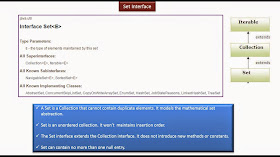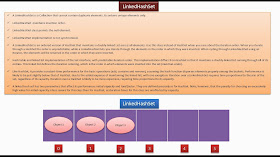Click here to watch in Youtube :
https://www.youtube.com/watch?v=xvtzO_UjhrA&list=UUhwKlOVR041tngjerWxVccw
TreeSetExample.java
https://www.youtube.com/watch?v=xvtzO_UjhrA&list=UUhwKlOVR041tngjerWxVccw
TreeSetExample.java
import java.util.LinkedList; import java.util.TreeSet; /* * Example of retainAll(Collection<?> c) method. */ public class TreeSetExample { public static void main( String[] args ) { TreeSet<Integer> treeSet = new TreeSet<Integer>(); treeSet.add(40); treeSet.add(20); treeSet.add(30); treeSet.add(100); treeSet.add(200); System.out.println("treeSet : " + treeSet + "\n"); LinkedList<Integer> linkedList = new LinkedList<Integer>(); linkedList.add(100); linkedList.add(200); System.out.println("linkedList : " + linkedList + "\n"); /* * Retains only the elements in this set that are contained in the * specified collection (optional operation). In other words, removes * from this set all of its elements that are not contained in the * specified collection. * * If the specified collection is also a set, this operation effectively * modifies this set so that its value is the intersection of the two * sets. */ boolean isRetained = treeSet.retainAll(linkedList); System.out.println("isRetained : " + isRetained); System.out.println("treeSet : " + treeSet + "\n"); } }
Output
treeSet : [20, 30, 40, 100, 200] linkedList : [100, 200] isRetained : true treeSet : [100, 200]
https://sites.google.com/site/javaee4321/java-collections/TreeSetDemoRetainAll.zip?attredirects=0&d=1
See also:

.jpg)
.jpg)
.jpg)
.jpg)
.jpg)
.jpg)
.jpg)





.jpg)
.jpg)
.jpg)
.jpg)
.jpg)
.jpg)
.jpg)
.jpg)
.jpg)
.jpg)
.jpg)

.jpg)
.jpg)

.jpg)
.jpg)
.jpg)
.jpg)
.jpg)
.jpg)
.jpg)
.jpg)
.jpg)
.jpg)
.jpg)
.jpg)